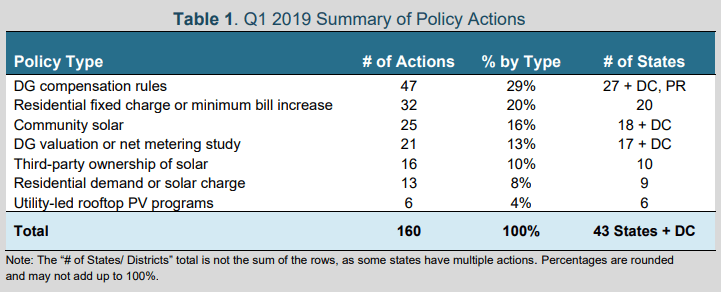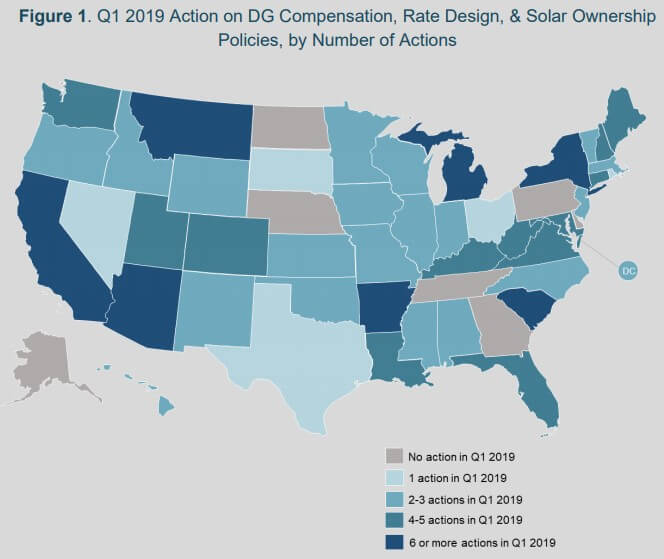During the first quarter of the year, 43 states plus the District of Columbia and Puerto Rico took some type of policy action regarding distributed solar, according to a new report from the N.C. Clean Energy Technology Center (NCCETC), part of the College of Engineering at North Carolina State University.
The Q1 2019 edition of “The 50 States of Solar” provides insights on state regulatory and legislative discussions and actions on distributed solar policy, with a focus on net metering, distributed solar valuation, community solar, residential fixed charges, residential demand and solar charges, third-party ownership, and utility-led rooftop solar programs.
In Q1, the report finds, the greatest number of policy actions related to net metering, residential fixed-charge or minimum bill increases, and community solar.

A total of 160 distributed solar policy actions were taken, with the greatest number of actions taken in California, Michigan, Arizona, Arkansas, Montana, New York and South Carolina. The only states that did not take any distributed solar policy action, according to the report, were Georgia, Tennessee, Pennsylvania, Delaware, North Dakota, Alaska and Nebraska.

The report identifies three trends in solar policy activity taken in Q1: (1) state legislatures weighing in on distributed generation rate design, (2) states moving in different directions on net metering, and (3) a number of new states considering adopting community solar policies. State legislatures considered at least 141 bills related to net metering, rate design, and solar ownership policies during Q1, with seven bills enacted so far.
“Solar policy remains a hot topic in state legislatures, with lawmakers taking on increasingly complex issues from rate design to net billing during a particularly active legislative season,” notes Brian Lips, senior policy project manager at NCCETC.
The report also lists the top five policy developments of the quarter:
- The Maine state legislature restored retail-rate net metering;
- Kentucky lawmakers initiated the development of a net metering successor tariff;
- The Arkansas legislature legalized solar leasing and addressed net metering successor tariffs;
- Colorado regulators opened a new rulemaking on community solar and net metering; and
- The Sacramento Municipal Utility District in California proposed a new grid-access charge for customers with on-site generation.
“The future of net metering is very much a state-by-state question right now,” says Autumn Proudlove, lead author of the report and senior manager of policy Research at NCCETC. “While some states are adopting successor tariffs, others are expanding net metering or, in Maine’s case, returning to net metering after adopting a controversial successor tariff.”
More on NCCETC’s report can be found here.




